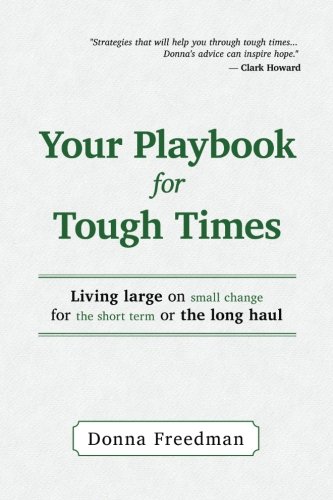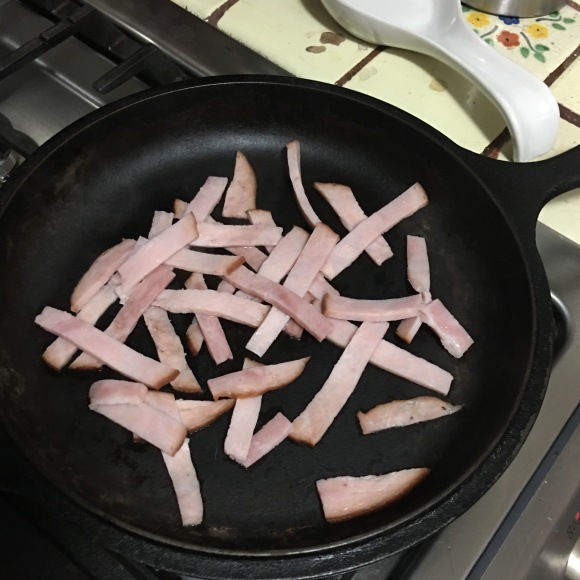I first came across Donna Freedman’s writing nine years ago, when I stumbled on an article called “Surviving and Thriving on $12,00 a Year.” I was experiencing a personal Upheaval that year, and this brave woman’s proclamation to the world of how she planned to address her own unstable circumstances looked to me like a letter from a supportive friend: “Things may be bad now,” she seemed to say, “but we can make them better if we hang together.” I can’t tell you how many sleepless nights found me re-reading her article, just to know that I wasn’t alone. I’ve read pretty much everything she’s written since then, and played the at-home game of the financial tips and tricks she’s tried in her own life, and do you know what? Things DID get better. Little by little, I managed to pay off all my debt (twice! I’m a slow learner), begin to save, and eventually get to a place of peace regarding my finances. During that time, I met and married my husband and moved halfway across the country where we bought our first house together and figured out a way for him to quit his job and return to school full-time. I even got to meet Donna in person and share a couple of meals and good conversations with her when she came to our new home town of Austin, Texas… Something my scared and overwhelmed Past Self could never have imagined in 2007!
So when her book Your Playbook for Tough Times came out, I couldn’t wait to get my hands on it! Fortunately, I didn’t have to: I was lucky enough to receive a copy to review.

One of the things that I have always loved about Donna’s outlook is her firm belief that frugal living– even when things are at their tightest– doesn’t have to be miserable and that in fact, it can be quite lovely. Her book promises to show you what she’s learned about living on less whether you’re presently in dire straits, anticipating financial difficulties soon to come, or simply trying to squeeze the most out of your current lifestyle.
And she delivers on her promises in spades, with literally hundreds of solution-oriented tips, offering ways to find more budgetary breathing room that hit from all angles, such as how to earn more, how to spend less, and perhaps the most radical idea of all: how to live happily with less altogether.
The Great Recession of 2008 marked the beginning of an exciting time for the personal finance genre. Whereas historically, books on finance have been written by economists and titans of business, Post-Recession financial bloggers and authors are people from all walks of life, sharing the daily unfoldment of their personal setbacks, life experiments, and successes. Donna Freedman is a shining example of this New Breed of personal finance writer: Just about everything she suggests in her book is something she has personally tried and found worthy of suggesting. Because learning the principles of real estate investing or restructuring corporations may be interesting, but sometimes, you just need someone to tell you how to keep your electricity on or make sure that your kids get dinner.
The book is an easy read, almost like an e-mail from a trusted friend. It’s peppered with personal anecdotes and loaded with concrete resources, from money-saving websites to resources for healthcare and housing, to suggested scripts for negotiating better prices on purchases. If you need to streamline your financial situation today, this book can help you do it, because Donna has done a tremendous amount of thorough research for you so that all you have to do is get online or pick up the phone to start making your life better.
Overall, I think it’s a terrific resource for anyone looking to wrangle their financial situation into something more manageable. It’s the sort of book you’d want to keep around, so you can implement some of the suggestions and then come back for more once those have been mastered. And it would make a wonderful and sensitive gift for anyone facing some kind of financial upheaval.
The book is available as a paperback or an e-book, and over at Amazon, if you buy the paperback, you can get the Kindle version for $1.99, which makes it nice for sharing.
If you read it, I’d love to hear what you think… please come back and share in the comments!















 About five months ago, Mr. Vega left his career in sales to become a full-time student. In addition to giving him an escape from burnout and a way to experience himself and the world in completely different ways, it’s also given us a chance to see if we could really walk our financial talk. We’ve taken great pains over the years to design our life together so that we could manage on one income, but we never had to before.
About five months ago, Mr. Vega left his career in sales to become a full-time student. In addition to giving him an escape from burnout and a way to experience himself and the world in completely different ways, it’s also given us a chance to see if we could really walk our financial talk. We’ve taken great pains over the years to design our life together so that we could manage on one income, but we never had to before.


